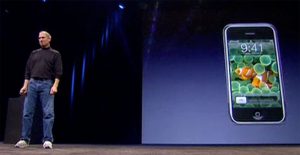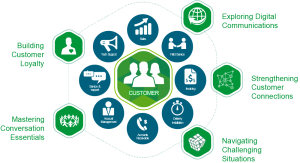The race of startups in all parts of the world is one of the factors which affected the technological research the most. Small firms and companies fighting to make their names known have pushed them to take bold choices towards the development of new technologies. Investments ranging up to multiple millions have created more incentive than ever to create the next step in all areas of research.
Nowadays, it seems like that drive has strongly influenced technologies affecting the daily lives of consumers, focusing on the way they interact with their environment.
How did all this start? How big of an impact can a single product have on steady markets where giants dominate? One the first example of a product that disrupted a market on some scale was the first IPhone released by Apple in 2007.

At that time, Nokia was the steady “winner” of the phone industry, and Apple’s arrival, with the idea of adding access to the internet to our cell phones by creating a smart device, turned the industry upside down as analyzed by Moses Kirathe in his blog post. He renders the fact that after the IPhone’s arrival, Nokia’s undeniable dominance over the market of cell phones got seriously tampered with, as consumers discovered the (considerably) life changing capabilities of this idea. Different opinions have led me to believe that this advancement was disruptive but also sustaining, which I believe is the reason why it got so popular so fast. This evolvement of the industry stayed accessible to consumers (the technological change could be handled without training).
This is one instance of this type of technologic cultural change, but so many more have happened since then. Even without a thorough analysis, it is not hard to determine that the disruptive/sustaining changes in nowadays technology have a major impact on our culture, which is why the drive that is pushing companies to develop newer and newer technologies is also to be considered from a cultural point of view. The blog “The Influence of Technology on Culture” written by Timea Szell mapes out really well how different aspects of developing daily lives technology can impact the way we map out information and interact with it.
I believe tha t it is necessary for this drive to continue to happen in order for the general public to have access to life changing capabilities in the next few decades, even though the systems put in place sometimes tend to fail (kickstarter frauds, insurance scams…). Such creative potential is necessary for life standards and opportunities to expand our range of action.
t it is necessary for this drive to continue to happen in order for the general public to have access to life changing capabilities in the next few decades, even though the systems put in place sometimes tend to fail (kickstarter frauds, insurance scams…). Such creative potential is necessary for life standards and opportunities to expand our range of action.
What do you think of this? Feel free to talk about it in the comments!

 First point of analysis is why the market responds so well. The first main reason is that the consumer have a greatly widened eating options since they now access to smaller restaurants that could not afford a delivery service before, but also to restaurants further away that had a limited delivery service before linking with these systems. The second reason is that it creates very accessible jobs for individuals that have access to a vehicle and wish to boost their finance. These jobs require close to no experience and are extremely flexible since for most of these services the worker checks in whenever they can/want, with no set timetable and a wide selection of work hours 7 days a week. There is also a good reaction from the market since with a larger access to restaurants offering similar cuisine forced some of these restaurants to lower prices, therefore adding even more weight to the accessibility value of this new food delivery system.
First point of analysis is why the market responds so well. The first main reason is that the consumer have a greatly widened eating options since they now access to smaller restaurants that could not afford a delivery service before, but also to restaurants further away that had a limited delivery service before linking with these systems. The second reason is that it creates very accessible jobs for individuals that have access to a vehicle and wish to boost their finance. These jobs require close to no experience and are extremely flexible since for most of these services the worker checks in whenever they can/want, with no set timetable and a wide selection of work hours 7 days a week. There is also a good reaction from the market since with a larger access to restaurants offering similar cuisine forced some of these restaurants to lower prices, therefore adding even more weight to the accessibility value of this new food delivery system.

 *3
*3 *4
*4